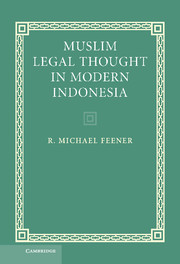Book contents
- Frontmatter
- Contents
- Acknowledgments
- A note on transliteration
- List of abbreviations
- Preface: Toward an intellectual history of modern Indonesian Islam
- 1 Technology, training, and cultural transformation
- 2 The open gate of ijtihād
- 3 An “Indonesian madhhab”
- 4 Sharī ʿa Islam in a Pancasila nation
- 5 New Muslim intellectuals and the “re-actualization” of Islam
- 6 The new ‘ulamā’
- 7 Next generation fiqh?
- Conclusion
- Bibliography
- Index
5 - New Muslim intellectuals and the “re-actualization” of Islam
Published online by Cambridge University Press: 29 September 2009
- Frontmatter
- Contents
- Acknowledgments
- A note on transliteration
- List of abbreviations
- Preface: Toward an intellectual history of modern Indonesian Islam
- 1 Technology, training, and cultural transformation
- 2 The open gate of ijtihād
- 3 An “Indonesian madhhab”
- 4 Sharī ʿa Islam in a Pancasila nation
- 5 New Muslim intellectuals and the “re-actualization” of Islam
- 6 The new ‘ulamā’
- 7 Next generation fiqh?
- Conclusion
- Bibliography
- Index
Summary
As religion and the civil laws should aim principally to make good citizens of men, one sees that when either of these departs from this end, the other should aim more toward it.
Montesquieu, De l'esprit des loisThe Islamic revival of late twentieth-century Indonesia was to a considerable extent facilitated by the very success of the New Order's developmentalist agenda. Economic growth and the restructuring of the national educational system produced a burgeoning new middle class of literate Indonesian Muslims, who have become a significant factor in the nation's political and socio-cultural dynamics since the 1970s. In the early years of the New Order, Suharto's drive to consolidate power energized a new wave of policies directed toward the systematic disenfranchisement of Muslim political parties. As discussed in chapter 4 in relation to the burgeoning da'wa movements of Indonesia during the 1970s–90s, outside the sphere of politics proper, however, new Muslim social movements experienced considerable growth during this same period. Abdurrahman Wahid, the charismatic NU leader who worked closely with a number of liberal Muslim thinkers during this period, expressed the aspirations of some segments of the Muslim community at that time in these terms: “democracy constitutes the hope of those who reject the use of the state to serve religious interests, while at the same time democracy is able to create space for religion in society.”
- Type
- Chapter
- Information
- Muslim Legal Thought in Modern Indonesia , pp. 118 - 150Publisher: Cambridge University PressPrint publication year: 2007
- 1
- Cited by



